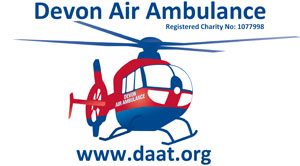 Devon Air Ambulance (“DAA”) is a charity that provides critical care service to all residents and visitors to Devon and neighbouring counties. Its services are provided on the basis of clinical need, urgency, accessibility and distance to the right hospital to treat the patient. Celebrating its 25th year in service, DAA operate all year round and most recently expanded to incorporate night flying in Autumn 2016. In 2015, DAA assisted a total of 806 patients.
Devon Air Ambulance (“DAA”) is a charity that provides critical care service to all residents and visitors to Devon and neighbouring counties. Its services are provided on the basis of clinical need, urgency, accessibility and distance to the right hospital to treat the patient. Celebrating its 25th year in service, DAA operate all year round and most recently expanded to incorporate night flying in Autumn 2016. In 2015, DAA assisted a total of 806 patients.
Air Ambulance services across the globe rely on a variety of different funding models. This may include public or private ownership payable by way of a mandatory or voluntary levy through the taxation or insurance regimes. Some are also membership based. As a charity, DAA’s sole source of funding is through public support (donations, community and business support, legacies, charity shops and a weekly lottery). The objective of all these is to ensure sufficient funding to cover recurring expenses.
With annual operating costs of ca. £5.5m, forecasting diverse revenue streams can be challenging and hence the need to retain a high profile within a competitive sector and to engage with the community. Specialist Paramedics in Critical Care within the service are seconded from the South Western Ambulance Service NHS Foundation Trust, supported in part by the Charity.
As part of the 2017 five year plan, their key financial objective was to increase income to £6.5m, which was met in 2016. This continues to generate sustainable income to support the increased cost of patient services, plus clinical development and a surplus to cover payments for aircraft maintenance, repairs, replacement parts and future new aircraft requirements.
A crucial corporate governance metric for charities, is the level of funding that is absorbed by administrative costs. In 2015, approximately 7% of expenditure related to support costs and for each £1 spent on fundraising and income generation (including retail and lottery) they raised £2.60.
In order to make further efficiency gains, their internal accounting systems have recently been updated moving to cloud-based Sage 200 software, a simplified ledger system and the use of Concur for purchases and payments. While the implementation of large projects rarely proceeds without challenges, the emphasis has been on the process of the project’s implementation with support and input from all teams associated with the change.
Financial risk management remains conservative with the goal of preserving the real value of their investments. Financial performance is strong with a net surplus margin (23.3%), significant funds on hand (£14.1m) and positive cash flow generation (£3.3m) for 2015. These levels of return are required to maintain the service including expensive capital items such as periodic replacements of helicopters. We do not foresee a reason why this strong performance should not continue.
From an asset management perspective, a Perpetual Trust could in our opinion accommodate a more moderate risk appetite. Their low-risk appetite acknowledges the need to meet the expectation of the community and plan for the purchase of a replacement aircraft in 2020 and additional unforeseen expenses. They will need to not only maintain these funds but continue to grow revenues to further enhance the service and meet new cost commitments. These funds are already on hand and are invested with four major banks and Kleinwort Benson.
